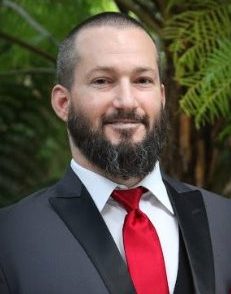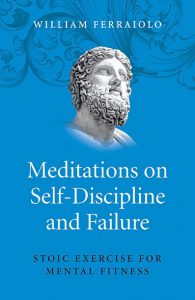 Q: How would you introduce yourself and your work to our readers?
Q: How would you introduce yourself and your work to our readers?
Some of my work might be worth reading, but I am an insignificant man who will soon pass on (as is true for all of us) and be forgotten. Most of the work I have published thus far can be found here.
I also have a book coming out in 2017. The title is Meditations on Self-Discipline and Failure: Stoic Exercise for Mental Fitness. That looks like a shameless plug, and it is, but I am far more interested in people reading my work and, hopefully, deriving some benefit from it, than I am in those people “getting to know me”. I don’t particularly matter. I am comfortable with that.
Q: How do you currently makes use of Stoicism in your work?
I am a philosophy professor, but I do not teach any courses explicitly devoted to Stoicism or any related subject matter. That is not up to me (a condition that I embrace with a Stoic/Nietzschean attitude of amor fati). The primary use of Stoicism in my work pertains to dealing with my colleagues, my students, and our administration. In the absence of a Stoic inclination, I might do things that would result in losing my job and getting arrested. Instead, I frequently remind myself that other persons, their words, and their behavior, are not entrusted to my control and, therefore, ought to remain matters of rationally cultivated indifference (though I do pay attention).
Q: When and how did you first become interested in Stoicism?
I never took any courses in graduate school that even mentioned Stoicism. This now strikes me as very odd. How does one obtain a Ph.D in philosophy without studying any of the Hellenistic schools – or any Buddhism for that matter? I became interested in Stoicism because I always had a bad temper, and I seem to have inherited an inclination to anxiety and depression from my father. When I was around 30 years old, and my knees and neck were destroyed from wrestling, football (American), and boxing, I knew that I could no longer release anxiety and the attendant aggression in combat and collision sports. A propitious encounter with the Enchiridion of Epictetus saved me from myself (so far, at least).
Q: What’s the most important aspect of Stoicism to you?
The centerpiece of Stoic counsel is learning to distinguish clearly between that which one can control and that which one cannot. The crucial correlate is emotional and psychological renunciation of any self-centered desires concerning that which lies beyond one’s control. How much needless frustration, anxiety, and despair issue from the obsession with events and conditions that lie beyond the direct control of the will? How much better off would we be if we just reallocated our intellectual energy to the small sphere of conditions over which we do have direct control (i.e. our will, our attitudes, our virtue, etc.)? I have enough flaws of my own to keep me busy. I will leave the external world to unfold as it may.
Q: In what ways do you think Stoicism still matters today?
I live in the United States, and it is, in my judgement, a fading empire in precipitous (and irreversible) decline. Indeed, much of the Western World may be on the same moribund downslope. When the nation and culture that you grew up thinking of as “yours” (simply because you were born into them) start to become unrecognizable, corrupt, and self-destructive… Stoicism really comes in handy. I will pay attention, and I will observe the coming collapse, but I will do my best to avoid becoming what I behold. When I find myself mourning the impending loss of “my” culture, I remind myself that it is “mine” only by happenstance, and that nothing is really “built to last” in any event.
Q: How has Stoicism affected the way you live your life?
I now spend much more time and intellectual energy trying to rectify my own character and my own behavior than I did before I discovered Stoicism. This leaves far less time and energy for carping and complaining about other people, the state of political or economic affairs, or the dearth of wisdom and virtue in the public sphere (though I still manage to do all of that a lot more than a good Stoic should).
Q: What’s one of your favourite Stoic quotations and why?
Book Two of The Meditations starts with:
Begin the morning by saying to thyself, I shall meet with the busy-body, the ungrateful, arrogant, deceitful, envious, unsocial. All these things happen to them by reason of their ignorance of what is good and evil. But I who have seen the nature of the good that it is beautiful, and of the bad that it is ugly, and the nature of him who does wrong, that it is akin to me, not only of the same blood or seed, but that it participates in the same intelligence and the same portion of the divinity, I can neither be injured by any of them, for no one can fix on me what is ugly, nor can I be angry with my kinsman, nor hate him, For we are made for co-operation, like feet, like hands, like eyelids, like the rows of the upper and lower teeth. To act against one another then is contrary to nature; and it is acting against one another to be vexed and to turn away.
Do that in earnest, and the day passes in relative serenity.
Q: What advice would you give someone wanted to learn more about Stoicism?
Start with Epictetus. Nearly all of the most beneficial techniques in modern CBT and REBT can be found in his Discourses and Enchiridion. From there, move on to Seneca and Marcus Aurelius. After working through the other ancient sources, check out the modern resurgence of Stoicism (of which events like Stoic Week are a wonderful part) and the authors of contemporary works about the application of Stoic techniques. This stuff still works!
 Q: Do you have anything else that you wanted to mention while we have the chance?
Q: Do you have anything else that you wanted to mention while we have the chance?
When you find that the world is driving you batty, remember that the world is not yours to control, and try to understand that whatever it is that is troubling you can be rectified… by working on yourself. That task is more than enough for any of us. Leave the world be. It never asked for your help.
William Ferraiolo has recently written a book entitled Meditations on Self–Discipline and Failure, due out in 2017.
Discover more from Modern Stoicism
Subscribe to get the latest posts sent to your email.




[…] Bill, thanks for the interview! I’ve read that you discovered Epictetus after you “could no longer release anxiety and the attendant aggression […]